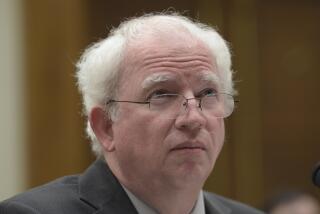Toyota is dealt another legal setback
- Share via
An arbitrator has ruled that a former Toyota Motor Corp. attorney can use internal company documents to press his claim that he was hired to “plan and carry out discovery fraud” on behalf of the company.
The ruling, which comes over objections from the automaker that the documents were privileged, did not determine whether Toyota committed such fraud. Instead, the decision found that former Toyota attorney Dimitrios Biller could use internal e-mails, test reports, memos and other documents as evidence in the case.
The ruling is the second legal setback for Toyota in the last two weeks.
The Supreme Court of Texas ruled Aug. 27 that the automaker must face charges that it acted in contempt of court in a 2007 rollover suit by hiding evidence from the plaintiff. Toyota has issued more than 12 million recall notices over the last year, many of them related to sudden acceleration, setting off a wave of litigation.
FOR THE RECORD:
Toyota case: In some editions Sept. 10, an article in the LATExtra section about a legal ruling involving Toyota Motor Corp. misidentified a judge who had barred release of company documents as a federal judge. The judge, John Segal, sits on Los Angeles County Superior Court. The story also said arbitrator Gary L. Taylor based a ruling on evidence only from plaintiff Dimitrios Biller. Taylor considered evidence from both Biller and Toyota. —
Biller’s suit, filed in July 2009 and now in arbitration, accuses Toyota of a conspiracy to hide and destroy evidence in product liability suits, including during the time he managed rollover lawsuits for the company.
Retired federal judge Gary L. Taylor, who is arbitrating the case, ruled that the documents could be used because they fall under what is known as the “crime-fraud exception” to attorney-client privilege. He stopped short, however, of allowing the documents to be made public and noted that he did “not rule that a crime or fraud has taken place.”
In a statement, Toyota said that the ruling was limited to “issues of evidence admissibility” and that there was “no finding that any misconduct has occurred or that any discovery fraud took place.”
The automaker denies any wrongdoing and said that Biller “continues to make inaccurate and misleading allegations about Toyota’s conduct, which we strongly dispute and will continue to fight vigorously.”
Biller, who was hired by Toyota in 2003 and left in 2007, has argued that Toyota deliberately withheld potentially damaging evidence during discovery in product liability lawsuits.
“I finally will be able to present my own story and hundreds of documents before the arbitrator,” Biller said of Taylor’s ruling. “I’ve been fighting for this for a long time.”
He left the company after signing a nearly $4-million severance agreement, but also took with him several thousand company documents that he argues prove his allegations.
Last fall, a California Superior court judge, John Segal, ruled that revealing the documents would cause “irreparable harm” to the company and referred Biller to the state bar for potential violations of professional conduct. The bar took no action on that matter.
Judge Taylor’s decision, handed down late Thursday, was based on evidence from Biller and Toyota over the relevance of the documents in supporting Biller’s allegations of fraudulent practices. A final hearing on the matter is scheduled for Nov. 15.
Taylor limited his decision to about 135 documents. The judge indicated that he would consider the admissibility of other documents on a case-by-case basis.
The documents, which were subpoenaed by Congress, have not been made public. The ruling could encourage plaintiffs’ attorneys in hundreds of pending lawsuits against Toyota to subpoena the documents as evidence in their cases.






